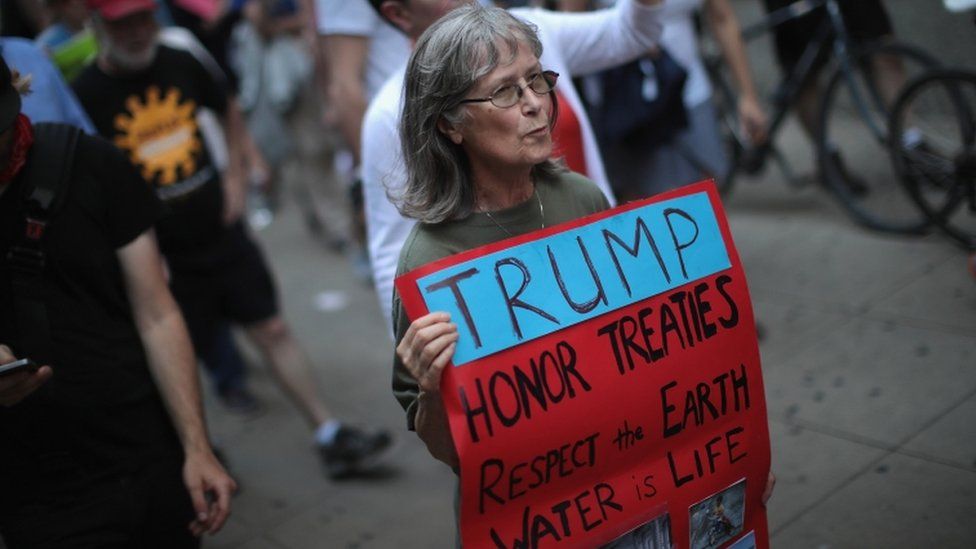Trump 'does believe in climate change', says US ambassador to UN
- Published

US President Donald Trump "believes the climate is changing and he believes pollutants are part of the equation," says the US ambassador to the UN.
He knows "the US has to be responsible for it and that's what we're going to do," said Nikki Haley.
The president provoked widespread condemnation when he announced on Thursday the US would withdraw from the Paris climate change agreement.
The US becomes one of only three countries outside its framework.
When he made the announcement, Mr Trump said the deal would hurt the US economy. He made no mention of climate change science.
During his election campaign, Mr Trump had said that climate change was a hoax and, since his announcement on Thursday, has avoided questions on the subject, as has White House press secretary Sean Spicer.
"Just because the US got out of a club doesn't mean we aren't going to care about the environment," Ms Haley told CNN, adding that the terms of the Paris agreement, reached in 2015, were "too onerous".
Scott Pruitt, the head of the US Environmental Protection Agency, said: "The world applauded when we joined Paris. And you know why? I think they applauded because they knew it would put this country at a disadvantage."
Mr Trump said the agreement would cost the US $3tn (£2.3tn) in lost GDP and 6.5 million jobs - while rival economies like China and India were treated more favourably.
The president is "absolutely intent on making sure that we have clean air, clean water, that he makes sure that we're doing everything we can to keep America's moral compass in the world when it comes to the environment," said Ms Haley.
Only war-torn Syria and Nicaragua, which believes the accords don't go far enough, failed to sign the Paris agreement.
China, the EU and India, which along with the US make up the four biggest emitters of carbon dioxide, have restated their commitment to the accord.
"The protection of the environment and the mother planet is an article of faith," said India's Prime Minister Narendra Modi, after meeting France's President Emmanuel Macron in Paris on Saturday.
The Paris agreement committed countries to keeping rising global temperatures "well below" 2C (3.6F) above pre-industrial levels and "endeavour to limit" them even more, to 1.5C.
The World Meteorological Organisation said that, in the worst scenario, the US pullout could add 0.3C to global temperatures by the end of the century.
France and India are members of the International Solar Alliance, set up following the Paris agreement, which aims to generate $1tn of investment in solar power by 2030.
What was agreed in Paris?
Climate change, or global warming, refers to the damaging effect of gases, or emissions, released from industry, transportation, agriculture and other areas into the atmosphere.
The Paris accord is meant to limit the global rise in temperature attributed to emissions.
Countries agreed to:
- Keep global temperatures "well below" the level of 2C (3.6F) above pre-industrial times and "endeavour to limit" them even more, to 1.5C
- Limit the amount of greenhouse gases emitted by human activity to the same levels that trees, soil and oceans can absorb naturally, beginning at some point between 2050 and 2100
- Review each country's contribution to cutting emissions every five years so they scale up to the challenge
- Enable rich countries to help poorer nations by providing "climate finance" to adapt to climate change and switch to renewable energy
Nasa's Goddard Institute for Space Studies says the world's average temperature has risen by about 0.8C since 1880, two-thirds of that since 1975.
US think tank Climate Interactive predicts that if all nations fully achieve their Paris pledges, the average global surface temperature rise by 2100 will be 3.3C, or 3.6C without the US.
- Published2 June 2017
- Published1 June 2017
- Published2 June 2017
- Published1 June 2017
- Published1 June 2017
- Published1 June 2017
- Published8 February